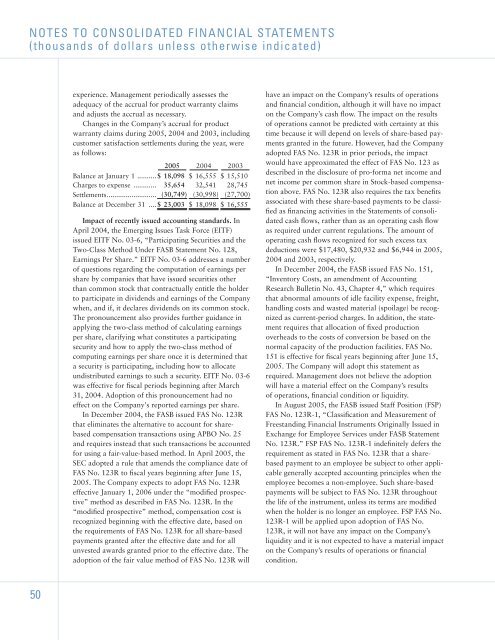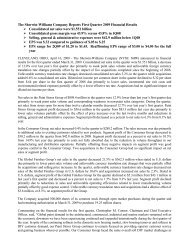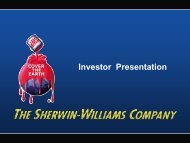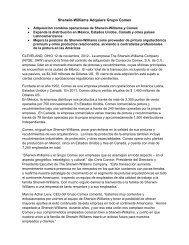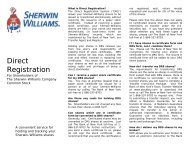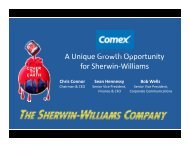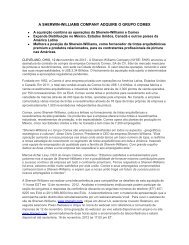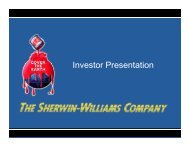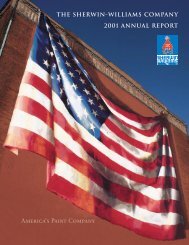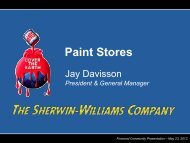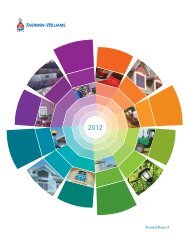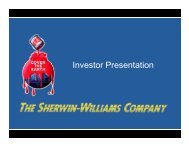2005 Annual Report - Investor Relations - Sherwin-Williams
2005 Annual Report - Investor Relations - Sherwin-Williams
2005 Annual Report - Investor Relations - Sherwin-Williams
You also want an ePaper? Increase the reach of your titles
YUMPU automatically turns print PDFs into web optimized ePapers that Google loves.
NOTES TO CONSOLIDATED FINANCIAL STATEMENTS<br />
(thousands of dollars unless otherwise indicated)<br />
experience. Management periodically assesses the<br />
adequacy of the accrual for product warranty claims<br />
and adjusts the accrual as necessary.<br />
Changes in the Company’s accrual for product<br />
warranty claims during <strong>2005</strong>, 2004 and 2003, including<br />
customer satisfaction settlements during the year, were<br />
as follows:<br />
<strong>2005</strong> 2004 2003<br />
Balance at January 1 ..........$ 18,098 $ 16,555 $ 15,510<br />
Charges to expense ............ 35,654 32,541 28,745<br />
Settlements.......................... (30,749) (30,998) (27,700)<br />
Balance at December 31 ....$ 23,003 $ 18,098 $ 16,555<br />
Impact of recently issued accounting standards. In<br />
April 2004, the Emerging Issues Task Force (EITF)<br />
issued EITF No. 03-6, “Participating Securities and the<br />
Two-Class Method Under FASB Statement No. 128,<br />
Earnings Per Share.” EITF No. 03-6 addresses a number<br />
of questions regarding the computation of earnings per<br />
share by companies that have issued securities other<br />
than common stock that contractually entitle the holder<br />
to participate in dividends and earnings of the Company<br />
when, and if, it declares dividends on its common stock.<br />
The pronouncement also provides further guidance in<br />
applying the two-class method of calculating earnings<br />
per share, clarifying what constitutes a participating<br />
security and how to apply the two-class method of<br />
computing earnings per share once it is determined that<br />
a security is participating, including how to allocate<br />
undistributed earnings to such a security. EITF No. 03-6<br />
was effective for fiscal periods beginning after March<br />
31, 2004. Adoption of this pronouncement had no<br />
effect on the Company's reported earnings per share.<br />
In December 2004, the FASB issued FAS No. 123R<br />
that eliminates the alternative to account for sharebased<br />
compensation transactions using APBO No. 25<br />
and requires instead that such transactions be accounted<br />
for using a fair-value-based method. In April <strong>2005</strong>, the<br />
SEC adopted a rule that amends the compliance date of<br />
FAS No. 123R to fiscal years beginning after June 15,<br />
<strong>2005</strong>. The Company expects to adopt FAS No. 123R<br />
effective January 1, 2006 under the “modified prospective”<br />
method as described in FAS No. 123R. In the<br />
“modified prospective” method, compensation cost is<br />
recognized beginning with the effective date, based on<br />
the requirements of FAS No. 123R for all share-based<br />
payments granted after the effective date and for all<br />
unvested awards granted prior to the effective date. The<br />
adoption of the fair value method of FAS No. 123R will<br />
have an impact on the Company’s results of operations<br />
and financial condition, although it will have no impact<br />
on the Company’s cash flow. The impact on the results<br />
of operations cannot be predicted with certainty at this<br />
time because it will depend on levels of share-based payments<br />
granted in the future. However, had the Company<br />
adopted FAS No. 123R in prior periods, the impact<br />
would have approximated the effect of FAS No. 123 as<br />
described in the disclosure of pro-forma net income and<br />
net income per common share in Stock-based compensation<br />
above. FAS No. 123R also requires the tax benefits<br />
associated with these share-based payments to be classified<br />
as financing activities in the Statements of consolidated<br />
cash flows, rather than as an operating cash flow<br />
as required under current regulations. The amount of<br />
operating cash flows recognized for such excess tax<br />
deductions were $17,480, $20,932 and $6,944 in <strong>2005</strong>,<br />
2004 and 2003, respectively.<br />
In December 2004, the FASB issued FAS No. 151,<br />
“Inventory Costs, an amendment of Accounting<br />
Research Bulletin No. 43, Chapter 4,” which requires<br />
that abnormal amounts of idle facility expense, freight,<br />
handling costs and wasted material (spoilage) be recognized<br />
as current-period charges. In addition, the statement<br />
requires that allocation of fixed production<br />
overheads to the costs of conversion be based on the<br />
normal capacity of the production facilities. FAS No.<br />
151 is effective for fiscal years beginning after June 15,<br />
<strong>2005</strong>. The Company will adopt this statement as<br />
required. Management does not believe the adoption<br />
will have a material effect on the Company’s results<br />
of operations, financial condition or liquidity.<br />
In August <strong>2005</strong>, the FASB issued Staff Position (FSP)<br />
FAS No. 123R-1, “Classification and Measurement of<br />
Freestanding Financial Instruments Originally Issued in<br />
Exchange for Employee Services under FASB Statement<br />
No. 123R.” FSP FAS No. 123R-1 indefinitely defers the<br />
requirement as stated in FAS No. 123R that a sharebased<br />
payment to an employee be subject to other applicable<br />
generally accepted accounting principles when the<br />
employee becomes a non-employee. Such share-based<br />
payments will be subject to FAS No. 123R throughout<br />
the life of the instrument, unless its terms are modified<br />
when the holder is no longer an employee. FSP FAS No.<br />
123R-1 will be applied upon adoption of FAS No.<br />
123R, it will not have any impact on the Company’s<br />
liquidity and it is not expected to have a material impact<br />
on the Company’s results of operations or financial<br />
condition.<br />
50


